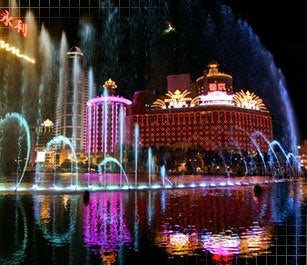Macau, Having Already Surpassed Las Vegas As A Gambling Destination, Sets Its Sights On Cultural, Culinary Offerings To Lure Tourists#

Since its handover in 1999, Macau has rapidly become one of Asia's top destinations for gambling, luring thousands of gamers from mainland China and Hong Kong. If Macau's tourism department has its way, though, the city will soon be as renowned as a cultural destination as well -- playing on its unique blend of Portuguese colonial and Chinese culture, architecture, and culinary traditions. Although construction of luxury apartments and casinos has slowed somewhat due to the global economic crisis, the city looks at the continuing growth of the Chinese tourist as a way to buoy a relatively sluggish tourism season.
Macau is unique in that it has, much like neighboring Hong Kong, combined two disparate cultures over the centuries to the point where they no longer seem distinct but instead form the one-of-a-kind Macanese culture. The city has also combined the entrepreneurial, fast-paced culture of China's biggest cities with a fascinating mix of people, cultures, and languages, making this one of the world's most exciting, truly global cities. The city has also become one of East Asia's luxury hubs.
As Elinor Garely writes in the ETN:
The mix of Asian, Portuguese, European and other cultures in Macau creates an ambiance that is both tumultuous and melodious as millions of visitors mix and mingle, dance and drink, site see and shop in a splendid urgency to spend money faster than it can be counted. Recession/depression? These words have not reached Macau where shoppers form long lines to purchase “real” bags/shoes/sweaters/jewelry from Louis Vuitton, Coach, Dior, Prada, Manolo, and other international high-end designers that are so expensive that only Asian high-rollers are likely buyers.
The Grand Canal shopping mall at the Venetian Hotel and Casino has hundreds of retail options that include Brooks Brothers, Chopard, Versace, Tiffany, and Tourneau.
Rumor has it that police at the Macau borders review purchases, forcing those with fabulous fakes (i.e., Gucci, LVs) to give them up or pay a hefty fee – thereby encouraging brand seekers to acquire the real thing or nothing at all.
In addition to shopping and gambling, Macau promotes itself heavily as a nightlife destination for visiting Hong Kong residents or long-term tourists. One of the more innovative branding techniques the Macau tourism marketers have adopted is going after female tourists, pushing the "girls night out" angle:
Thomas Yip, Sofitel’s Front Office Manager recommends the destination for “girls” night out. While the guys are glued to the baccarat tables at the Altira Hotel where the casino floors look more like a well-designed corporate board rooms, the “girls” can dress-up and head for the Cirque de Soleil’s Zaia (the exquisite story of a young girl who dreams of a space journey), dine lavishly at the Belcancao buffet (located in the Four Seasons Hotel mall), order a few drinks at the Lions Bar at the MGM Grand, and taxi back to their hotel at 3 AM.
Interested in what HK $1.9 billion can create? Bring the guys to Fisherman’s Wharf, settle them in at the Sand’s Casino (the largest casino in the universe) and the “girls” can head off to shop at Arte, Belford Jewellery and the Chinese Art Gallery, stopping for dinner at the Afrikana where musicians entertain, and a buffet or a la carte menu selection satisfies the hungriest shopper.
Macau has come a long way in the last 10 years, from a crime-ridden colony nearly forgotten by Portugal itself to the "Vegas of the East," and the city is making great strides to develop its tourism infrastructure to match its excellent gaming infrastructure. Already this has paid off, with more cultural tourists coming from surrounding countries and around the world to enjoy Macau's colonial relics, exciting nightlife, five-star hotels and Macanese culinary style. As more mainland tourists are drawn to this Special Administrative Region (SAR) on the periphery of China, Macau is certain to become one of the world's top spots for cultural tourism as well.